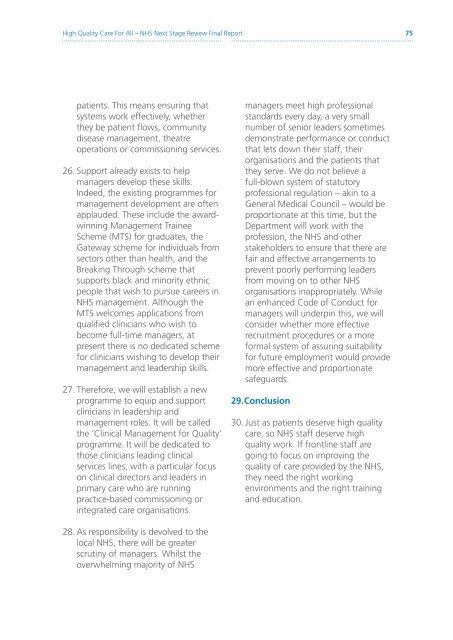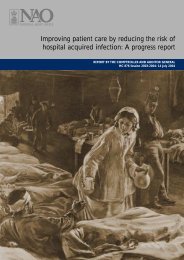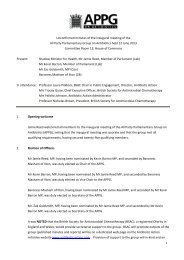High quality care for all NHS Next Stage Review - Antibiotic Action
High quality care for all NHS Next Stage Review - Antibiotic Action
High quality care for all NHS Next Stage Review - Antibiotic Action
You also want an ePaper? Increase the reach of your titles
YUMPU automatically turns print PDFs into web optimized ePapers that Google loves.
<strong>High</strong> Quality Care For All – <strong>NHS</strong> <strong>Next</strong> <strong>Stage</strong> <strong>Review</strong> Final Report75patients. This means ensuring thatsystems work effectively, whetherthey be patient flows, communitydisease management, theatreoperations or commissioning services.26. Support already exists to helpmanagers develop these skills.Indeed, the existing programmes <strong>for</strong>management development are oftenapplauded. These include the awardwinningManagement TraineeScheme (MTS) <strong>for</strong> graduates, theGateway scheme <strong>for</strong> individuals fromsectors other than health, and theBreaking Through scheme thatsupports black and minority ethnicpeople that wish to pursue <strong>care</strong>ers in<strong>NHS</strong> management. Although theMTS welcomes applications fromqualified clinicians who wish tobecome full-time managers, atpresent there is no dedicated scheme<strong>for</strong> clinicians wishing to develop theirmanagement and leadership skills.27. There<strong>for</strong>e, we will establish a newprogramme to equip and supportclinicians in leadership andmanagement roles. It will be c<strong>all</strong>edthe ‘Clinical Management <strong>for</strong> Quality’programme. It will be dedicated tothose clinicians leading clinicalservices lines, with a particular focuson clinical directors and leaders inprimary <strong>care</strong> who are runningpractice-based commissioning orintegrated <strong>care</strong> organisations.managers meet high professionalstandards every day, a very sm<strong>all</strong>number of senior leaders sometimesdemonstrate per<strong>for</strong>mance or conductthat lets down their staff, theirorganisations and the patients thatthey serve. We do not believe afull-blown system of statutoryprofessional regulation – akin to aGeneral Medical Council – would beproportionate at this time, but theDepartment will work with theprofession, the <strong>NHS</strong> and otherstakeholders to ensure that there arefair and effective arrangements toprevent poorly per<strong>for</strong>ming leadersfrom moving on to other <strong>NHS</strong>organisations inappropriately. Whilean enhanced Code of Conduct <strong>for</strong>managers will underpin this, we willconsider whether more effectiverecruitment procedures or a more<strong>for</strong>mal system of assuring suitability<strong>for</strong> future employment would providemore effective and proportionatesafeguards.29.Conclusion30. Just as patients deserve high <strong>quality</strong><strong>care</strong>, so <strong>NHS</strong> staff deserve high<strong>quality</strong> work. If frontline staff aregoing to focus on improving the<strong>quality</strong> of <strong>care</strong> provided by the <strong>NHS</strong>,they need the right workingenvironments and the right trainingand education.28. As responsibility is devolved to thelocal <strong>NHS</strong>, there will be greaterscrutiny of managers. Whilst theoverwhelming majority of <strong>NHS</strong>





